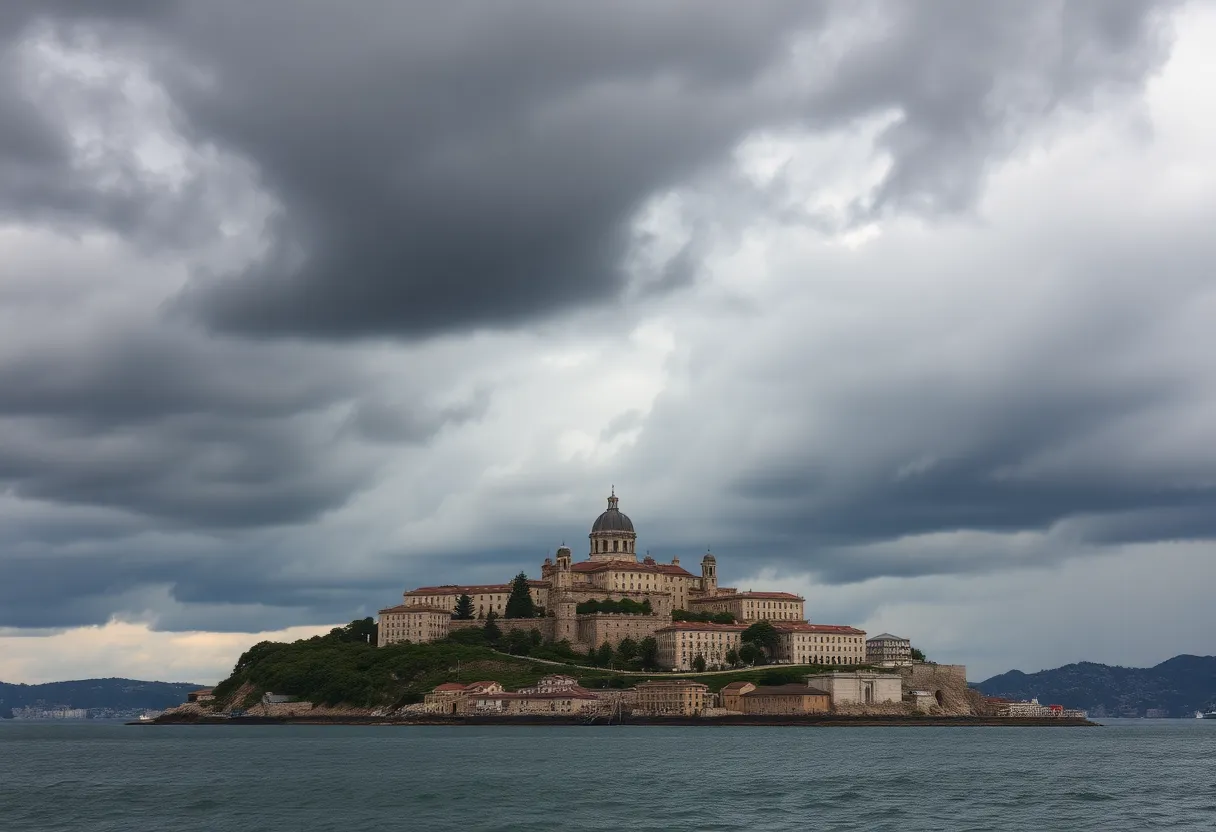News Summary
Former President Donald Trump has called for the reopening of Alcatraz prison, arguing it could help address rising concerns regarding violent offenders. His proposal has sparked a debate, with former FBI agent Jonathan Gilliam suggesting San Clemente Island as an alternative, citing its isolation as a deterrent for crime. The discussions reflect ongoing tensions within the criminal justice system and how best to manage repeat offenders. Critics caution about potential legal challenges to Trump’s vision, highlighting the complexities surrounding the issue.
Trump’s Alcatraz Vision Sparks Alternatives
Recent discussions have stirred up quite a buzz after former President Donald Trump took to Truth Social, making headlines with a bold statement about reopening Alcatraz prison. He posted a call to action, proclaiming, “REBUILD, AND OPEN ALCATRAZ!” His reasoning for this dramatic step? The growing concerns about *vicious, violent, and repeat Criminal Offenders* roaming free.
In his post, Trump highlighted the urgency for agencies like the Bureau of Prisons and the Department of Justice to whip up plans for a *“substantially enlarged and rebuilt”* Alcatraz. He believes that reviving this notorious prison would stand as a symbol for *“Law, Order, and JUSTICE,”* reminding the public of the hardline approaches of the past.
Calling for a New Home for Criminals
As debates unfold, former FBI special agent Jonathan Gilliam has stepped into the conversation, suggesting that perhaps San Clemente Island might be a better alternative than Alcatraz itself. Unlike the iconic prison, which has become a major tourist attraction since its closure in 1963, San Clemente Island is largely used by the U.S. Navy and remains tricky to access, as it’s only reachable by boat or air. This isolation is exactly what Gilliam believes could work in favor of keeping potential offenders at bay.
He emphasized the idea that with limited access, *”you would not want to go there because there’s nothing there.”* This island’s seclusion could effectively deter criminals, as it holds little appeal for anyone who values freedom.
Alcatraz: The History Behind the Walls
Alcatraz, infamous for housing the most hardened criminals—think names like Al Capone, George “Machine Gun” Kelly, and Robert Stroud—operated for nearly three decades, from 1934 to 1963. Even then, it was famously known for the extreme difficulty inmates faced when attempting to escape. The costs associated with keeping such a facility running led to its eventual closure, raising questions about whether reopening it makes sense in today’s world.
While Trump insists that only the worst criminals would be housed within a revamped version of Alcatraz, critics and legal experts warn that his plan could trigger an *“avalanche of lawsuits”* against the government. Given the legal landscape, the idea of reopening a prison on Alcatraz is fraught with challenges.
The Isolation Factor
Gilliam further pointed out unspoken rules about San Clemente Island, suggesting that out there, *“nobody can hear you scream.”* This adds a chilling twist to the conversation about criminal deterrence, as its remoteness evokes a sense of fear and foreboding. The idea of a prison in such a place might just strike the right fear into the hearts of potential offenders.
Trump argues that historically, America was not hesitant to lock up dangerous criminals and expresses a wish for the current mindset to revert back to those stricter times. He believes that if we brought back such facilities to house the most threatening members of society, it would indeed send a message about our commitment to safety and justice.
Looking Ahead
As the conversation continues to evolve, the future remains uncertain. The practicalities surrounding the reopening of either Alcatraz or a potential new facility on San Clemente Island are likely to spark discussions far and wide, influencing how society views its most dangerous offenders and how to contain them.
Whether Trump’s vision comes to fruition or if Gilliam’s proposal gains momentum, one thing is clear: The debate surrounding criminal justice and how best to handle offenders is very much alive and will undoubtedly keep us engaged for some time.
Deeper Dive: News & Info About This Topic
- Fox News: Alcatraz 2.0
- Florida Today: Alcatraz Florida Floating Prisons
- Fox News: Alcatraz’s Most Infamous Inmates
- Blavity: Why Was Alcatraz Closed
- SF Examiner: Alcatraz Ferry Plaza Redo
- Wikipedia: Alcatraz Island
- Google Search: Alcatraz prison
- Google Scholar: Alcatraz
- Encyclopedia Britannica: Alcatraz Island
- Google News: Prison Reform

Author: STAFF HERE PETERSBURG WRITER
The ST PETERSBURG STAFF WRITER represents the experienced team at HEREStPetersburg.com, your go-to source for actionable local news and information in St Petersburg, Pinellas County, and beyond. Specializing in "news you can use," we cover essential topics like product reviews for personal and business needs, local business directories, politics, real estate trends, neighborhood insights, and state news affecting the area—with deep expertise drawn from years of dedicated reporting and strong community input, including local press releases and business updates. We deliver top reporting on high-value events such as Grand Prix of St. Petersburg, Localtopia, and SHINE Mural Festival. Our coverage extends to key organizations like the St. Petersburg Area Chamber of Commerce and St. Pete Downtown Partnership, plus leading businesses in finance, manufacturing, and healthcare that power the local economy such as Raymond James Financial, Jabil, and Bayfront Health St. Petersburg. As part of the broader HERE network, including HEREJacksonville.com, HEREOrlando.com, HERETallahassee.com, and HERETampa.com, we provide comprehensive, credible insights into Florida's dynamic landscape.



